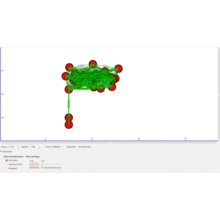Tag Archive: 'ns3 project'
Distributed applications require coordination of distributed software components in order to achieve a common goal. A coordination model that abstracts the complexity of network communication eases the development of such applications. The objective is to design collaboration with remote hosts in the same way as local interactions. Separation of coordination logic and application code increases maintainability, as components can be easily […]
Low latency, high throughput, and fairness are the stringent performance requirements of data centernetworks. For web applications continue to thrive, data center must remain effective by addressing these challenges. While most of the challenges have been handled by data center specific transport protocols (e.g. DCTCP), these transport protocols are not default options for data center users. Free […]
Binge drinking is an important global health issue that results in a range of health and social harms. Mobile technology’s portability and connectivity can be used in-situ to encourage the practice of monitoring and moderating alcohol use. Social networking services, if used among peer-supportnetworks to promote responsible drinking, could be effective in moderating alcohol consumption. In this article, the authors describe the […]
Name resolution is at the heart of Information-Centric Networking (ICN), where names are used to both identify information and/or services, and to guide routing and forwarding inside the network. The ICN focus on information, rather than hosts, raises significant concerns regarding the scalability of the required Name Resolution System (NRS), especially when considering global scale, inter-domain deployments. In the route-by-name approach to NRS construction, […]
We consider a peer-to-peer (P2P)-assisted video-on-demand (VoD) system where each peer can store a relatively small number of movies to offload the server when these movies are requested. User requests are stochastic based on some movie popularity distribution. The problem is how to replicate (or place) content at peer storage to minimize the server load. Several variations of this replication problem have been studied recently with somewhat […]
In this paper we give some background to how the long-lasting discussion on separation of identifiers and locators in networking has influenced the Information-centric Networking (ICN) research. We start with a historical retrospect of the id/locator discussion. We then address the problems that have been fueling the discussion followed by a chronological walkthrough of a number of id/locator split ideas up tosome […]
This paper focuses on incentivizing cooperative behavior in community-based autonomous networkingenvironments (like mobile social networks, etc.), in which through dynamically forming virtual and/or physical communities, users voluntarily participate in and contribute resources (or provide services) tothe community while consuming. Specifically, we proposed a simple but effective EGT (Evolutionary Game Theory)-based mechanism, VPEF (Voluntary Principle and round-based Entry Fee), to drive […]
In this paper, we present a new control-theoretic framework to efficiently design balanced coordinated resource allocation algorithms in a network based on semistabilization theory for discrete-time stochastic linear systems together with compartmental modeling. Specifically, necessary and sufficient conditions for equivalent, control-theoretic characterizations of the proposed balanced coordinated resource allocation design problem are derived, which are based on a new […]
Information-Centric Networking (ICN), an alternative architecture to the current Internet infrastructure, focuses on the distribution and retrieval of content by employing caches in a network to reduce networktraffic. The employment of caches may be accomplished using graph-based and content-based criteria such as the position of a node in a network and content popularity. The contribution of this paper lies on the characterization of content popularity […]
We present Munin, a software framework for building ubiquitous analytics environments consisting of multiple input and output surfaces, such as tabletop displays, wall-mounted displays, and mobile devices. Munin utilizes a service-based model where each device provides one or more dynamically loaded services for input, display, or computation. Using a peer-to-peer model for communication, it leverages IP multicast to replicate […]

 Click Here to watch our latest output video using NS3 simulator
Click Here to watch our latest output video using NS3 simulator  Click Here to watch our latest projects screenshots using NS3 simulator
Click Here to watch our latest projects screenshots using NS3 simulator